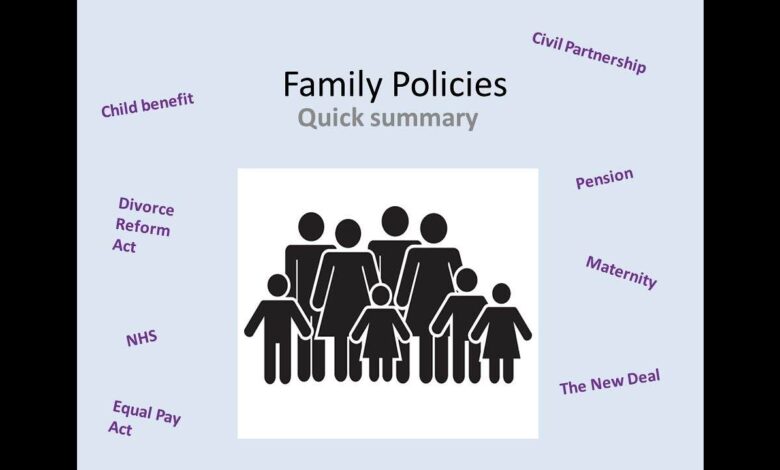The Importance of family policies and child care in Politics and Society

The way society treats families and children is a fundamental aspect of any political platform. Family policies and child care have a significant impact on the well-being of individuals and the broader community. This article will discuss the importance of family policies and child care in politics and society, why they matter, and what can be done to support families and children.
Introduction
Family policies and child care have become increasingly important in politics and society. These policies affect the lives of millions of families and children worldwide. The way society treats families and children is a fundamental aspect of any political platform, and family policies and child care have a significant impact on the well-being of individuals and the broader community.
Understanding Family Policies
Family policies refer to government initiatives that aim to support and protect families. These policies can take many forms, including financial assistance, parental leave, childcare subsidies, and education programs. Family policies aim to address issues such as poverty, child welfare, work-family balance, and social inequality.
Historical Context of Family Policies
Family policies have a long history, dating back to the early 20th century. During the Great Depression, the US government introduced programs to support families, such as the Aid to Dependent Children (ADC) and the Social Security Act. Since then, many countries have adopted similar policies to support families and children.
The Benefits of Family Policies and Child Care
Family policies and child care have numerous benefits for individuals and society. Studies have shown that family policies and child care improve children’s health and educational outcomes, increase workforce participation and productivity, reduce poverty and inequality, and promote gender equality.
The Impact of Child Care on the Workforce
Childcare has a significant impact on the workforce. Accessible and affordable child care allows parents to participate in the labor force and pursue their careers. Studies have shown that working mothers with access to affordable child care are more likely to remain employed, increase their earnings, and have more stable employment. Additionally, childcare subsidies can help low-income families access quality child care, which can reduce the risk of child maltreatment and neglect.
The Effect of Child Care on Children
Quality child care has a significant impact on children’s health and educational outcomes. Studies have shown that children who receive quality child care have better cognitive and socio-emotional development, perform better in school, and have fewer behavioral problems. Additionally, children who receive high-quality child care are more likely to succeed in the future, have higher earnings, and have lower rates of incarceration and dependency on welfare programs.
The Role of Family Policies in Supporting Gender Equality
Family policies play a vital role in supporting gender equality. Women often bear the burden of child-rearing and housework, which can limit their career opportunities and earning potential. Policies such as parental leave, childcare subsidies, and flexible work arrangements can help reduce this burden and promote gender equality. Additionally, studies have shown that countries with more extensive family policies have higher rates of female workforce participation and fewer gender-based wage gaps.
Economic Benefits of Family Policies and Child Care
Family policies and child care also have significant economic benefits. Accessible and affordable child care allows parents to continue working and contributing to the economy, which can increase economic growth and productivity. Additionally, family policies that support families with young children can reduce poverty and reliance on government assistance programs, which can save taxpayer dollars in the long run.
The Challenges of Implementing Family Policies and Child Care
Despite the numerous benefits of family policies and child care, implementing them can be challenging. The cost of providing childcare subsidies and other family policies can be high, and there may be resistance from employers and lawmakers who view them as a burden on businesses and the economy. Additionally, there may be cultural barriers to accepting family policies, as traditional gender roles and family structures may make it challenging to promote policies that support working parents and gender equality.
Child Care and Education in the United States
In the United States, child care and education have become significant issues in recent years. Many parents struggle to find affordable and quality child care, and the cost of child care can be prohibitive for low-income families. Additionally, access to quality education and early childhood education can have a significant impact on children’s long-term outcomes, but many families do not have access to these resources.
The Importance of Accessible and Affordable Child Care
Accessible and affordable child care is crucial for supporting families and promoting economic growth and productivity. Governments and businesses must invest in policies that support working parents and reduce the burden of childcare costs. Additionally, promoting gender equality and reducing poverty through family policies and child care can have a significant impact on society as a whole.



